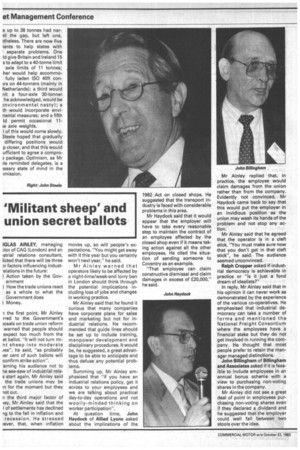'Militant sheep' and union secret ballots
Page 28

If you've noticed an error in this article please click here to report it so we can fix it.
IGLAS AINLEY, managing :Aar of CAG (London) and an Istrial relations consultant, lictecl that there will be three r factors influencing Industelations in the future: ) Action taken by the Government ) How the trade unions react as a whole to what the Government does I Money.
the first point, Mr Ainley rred to the Government's )osals on trade union reform warned that people should expect too much from the et ballot. "It will not turn mint sheep into moderate /es", he said, "as probably )er cent of such ballots will confirm strike action".
arning his audience not to he see-saw of industrial rela
s start again, Mr Ainley said the trade unions may be F n for the moment but they lot out.
n the third major factor of ley, Mr Ainley said that the I of settlements has declined hg to the fall in inflation and recession. He stressed /ever, that, when inflation moves up, so will people's expectations. "You might get away with it this year but you certainly won't next year," he said.
Mr Ainley warned that operators likely to be affected by a night-time/week-end lorry ban in London should think through the potential implications including loss of jobs and changes in working practice.
Mr Ainley said that he found it curious that many companies have corporate plans for sales and marketing but not for industrial relations. He recommended that guide lines should be set up to include training, manpower development and disciplinary procedures. It would be, he suggested, a great advantage to be able to anticipate and thus defuse any potential problems.
Summing up, Mr Ainley emphasised that "if you have an industrial relations policy, get it across to your employees and we are talking about practical day-to-day operations and not woolly-minded thinking on worker participation".
At question time, John Haydock of Allied Lyons asked about the implications of the 1982 Act on closed shops. He suggested that the transport industry is faced with considerable problems in this area.
Mr Haydock said that it would appear that the employer will have to take every reasonable step to maintain the contract of an employee affected by the closed shop even if it means taking action against all the other employees. He cited the situation of sending someone to Coventry as an example.
"That employee can claim constructive dismissal and claim damages in excess of £20,000," he said. Mr Ainley replied that, in practice, the employee would claim damages from the union rather than from the company. Evidently not convinced, Mr Haydock came back to say that this would put the employer in an invidious position as the union may wash its hands of the problem and not stop any action.
Mr Ainley said that he agreed that the operator is in a cleft stick. "You must make sure now that you don't get in that cleft stick", he said. The audience seemed unconvinced.
Ralph Cropper asked if industrial democracy is achievable in practice or "is it just a fond dream of idealists?"
In reply, Mr Ainley said that in his opinion it can never work as demonstrated by the experience of the various co-operatives. He emphasised that industrial democracy can take a number of forms and mentioned the National Freight Consortium where the employees have a financial stake but they do not get involved in running the company. He thought that most people prefer to retain the manager managed distinctions.
John Billingham of Billingham and Associates asked if it is feasible to include employees in an annual bonus scheme with a view to purchasing non-voting shares in the company.
Mr Ainley did not see a great deal of point in employees purchasing non-voting shares even if they declared a dividend and he suggested that the employer could well fall between two stools over the idea.
































































































